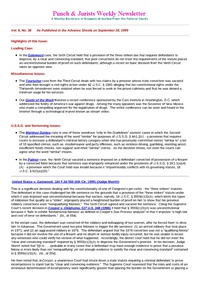Case held that county could not claim qualified immunity in action charging that general strip searches of detainees violated the Fourth Amendment in the absence of reasonable suspicion that detainees were concealing contraband.
In this case a detainee at the Nassau County Correctional Facility challenged the policy of …
In this case, the majority held that the provisions of the federal "Three Strikes" law, 18 USC § 3559, that count prior convictions of robberies as strikes unless the defendant can muster clear and convincing evidence to prove certain facts regarding the robberies do not violate the Fifth Amendment's …
This prison rights suit raises two interesting and potentially far reaching claims that deal with the issue of forced labor in American prisons - a concept that our Government is fond of saying exists only in places like China. Both claims were probably doomed from the outset because they …
Here the Court affirmed that persons who are not indicted or tried, but who are nonetheless criminally responsible for defendant's crime, are "participants" of the crime within the meaning of USSG § 3B1.1.
The Court held that leaving the physical description in the redacted confession, which clearly matched on of the defendants, was a blatant violation of the rule announced in Bruton v. U.S., 391 U.S. 123 (1968) - and was similar to the error that occurred in Gray v. Maryland, 523 …
In this case the Ninth Circuit held that a sentence enhancement that complied literally with the plain language of U.S.S.G. § 2K2.1(a)(4)(A) and its commentary was nevertheless improper because the use of that enhancement in this case “impermissibly conflicts with its governing statute, 18 U.S.C. § 921(a)(20).“ (Id., at1015). …
Here the Court held that a dismissal, even with prejudice, of a drug conspiracy indictment due to violations of the Speedy Trial Act did not preclude the Government from filing a second indictment, based on the same facts, but using a different crime.
The Court stated: "Even though …
Here the Court affirmed its prior decisions that the practice of allowing juror questions is a matter committed to the sound discretion of the trial judge and is not prejudicial per se.
The Court stated: "The district court's factual determination that Brockman was financially able to afford representation was not clearly erroneous. The evidence presented showed that Brockman received 'living expenses' of about $10,000 a month pursuant to a joint venture agreement he had with a company named 3KM. Among Brockman's …
The defendant in this case was charged with conspiracy and various substantive violations of the RICO statutes, including a charge that he committed murder in violation of the Federal law, known as the VCAR statute (18 U.S.C. § 1959), that prohibits acts of violence in aid of racketeering activities …
In this decision, which contains an excellent review of the law, particularly in the Seventh Circuit, relating to Rule 804(b)(3), the Court held that a codefendant's statement indicating thatb the defendant was the ringleader was not admissible.
The Court concluded: "After carefully reviewing the facts of this case …
The Court stated: "The restitution order directed that '[t]he restitution shall be paid in equal monthly installments during the period of incarceration through the Inmate Financial Responsibility Program' and in installments of $200 per month during the period of supervised release. Though this order makes clear that Pandiello is …
The Court stated that "'[T]he primary trait that distinguishes [a position of trust from other positions is] the extent to which the position provides the freedom to commit a difficult-to-detect wrong.' United States v. Viola, 35 F.3d 37, 45 (2d Cir. 1994) . . . Thus, a position of …
The Second Circuit described this case as “a good example of the growing complexity of the Guidelines and the difficulties in interpreting them.” (Id., at 205). It also shows the Guidelines penchant for removing all discretion from the Courts by trying to define every conceivable situation that might arise …
One of the issues addressed in this case was a four-level enhancement based on the district court's conclusion that the defendant was an organizer or leader of a criminal enterprise that was "otherwise extensive" under U.S.S.G.S 3B1.1(a). The Court acknowledged that "A 'participant' is a person who is criminally …
The Court stated: "Because the acceptance-of-responsibility guideline already takes post-offense rehabilitation efforts into account, departure under § 5K2.0 is warranted only if the defendant's efforts are exceptional enough to be atypical of the cases in which the acceptance-of-responsibility reduction is usually granted." (Id., at 889).
[Editor's Note: See U.S.S.G. …
Here the Court determined that the district court had made insufficient findings to support a vulnerable victim enhancement under USSG § 3A1.1(b) and noted that age alone is insufficient to support a claim that someone was a victim.
In this case the defendant pled guilty to an assortment of crimes including kipnapping and carjacking. At sentencing, the district court applied the provisions of U.S.S.G. § 2A4.1(b)(7)(B), which requires that, in instances where another offense is committed during a kidnapping, the sentencing court must apply the "offense guideline …
This is a significant decision dealing with the constitutionality of one of Congress’s pet rocks - the “three strikes” statutes. The defendant in this case challenged his life sentence on the grounds that a provision of the “three strikes” statute under which it was imposed was unconstitutional because that …
Here the Court held that placement on a state's daily interrupt status, during which he was released from prison on weekdays for work release, but required to stay in prison on weekends, was not a release from imprisonment under 18 USC 3624(e).
In this case the Government filed …
